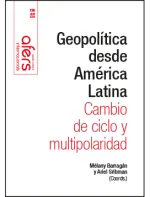Latin America and the Global South in a world without hegemony

Mónica Hirst, profesora, Universidad Torcuato Di Tella (UTDT), Buenos Aires (Argentina), e investigadora asociada, IESP/UERJ, Rio de Janeiro (Brasil) (hirstmoni@gmail.com), ORCID: https://orcid.org/0000-0002-4129-4039
Roberto Russell, profesor, UTDT y presidente, Fundación Vidanta (México) (russellroberto@gmail.com), ORCID: https://orcid.org/0009-0008-9231-8564
Ana María Sanjuan, investigadora, Universidad Central de Venezuela, Caracas (Venezuela) (anamaria.sanjuan@mail.com), ORCID: https://orcid.org/0009-0008-8037-952X
Juan Gabriel Tokatlian, profesor plenario, UTDT (jtokatlian@utdt.edu). ORCID: https://orcid.org/0009-0007-1139-6425
This article examines the state, future configuration and ways of managing the international order, as well as Latin America’s place in that order, to understand where it is now and reflect on what it might be like and how it might develop in the future. To do so, we employ the notion of “non-hegemonic order”, which has no start date because it stems from a combination of processes of varying duration and effects. We argue that the order taking shape will have two main fault lines: a breach between two opposing and different Norths – North 1 and North 2 – and another breach between the two Norths and a Global South diverse in resources and power configurations, of which Latin America forms part (with its own specificities). We address the singular position of the Latin American region which in a bid to consolidate its autonomy maintains a complex triangular Latin America-United States-China dynamic.
Key words: international order, non-hegemonic order, Latin America, Global South, United States, China, regionalism, interregnum
How to cite this article: Hirst, Mónica; Russell, Roberto; Sanjuan, Ana María y Tokatlian, Juan Gabriel. «América Latina y el Sur Global en tiempos sin hegemonías». Revista CIDOB d’Afers Internacionals, n.º 136 (abril de 2024), p. 133-156. DOI: doi.org/10.24241/rcai.2024.136.1.133
Revista CIDOB d’Afers Internacionals, n.º 135, p. 133-156
Quadrimestral (January-April 2024)
ISSN:1133-6595 | E-ISSN:2013-035X
DOI: https://doi.org/10.24241/rcai.2024.136.1.133
Este artículo se realizó en el marco del proyecto «Sociedad Civil, Cooperación Internacional y Relaciones América Latina-Estados Unidos» con aportes de la Fundación FORD.
>> The full text articles of this issue are available only in Spanish language